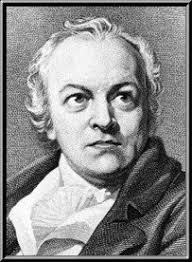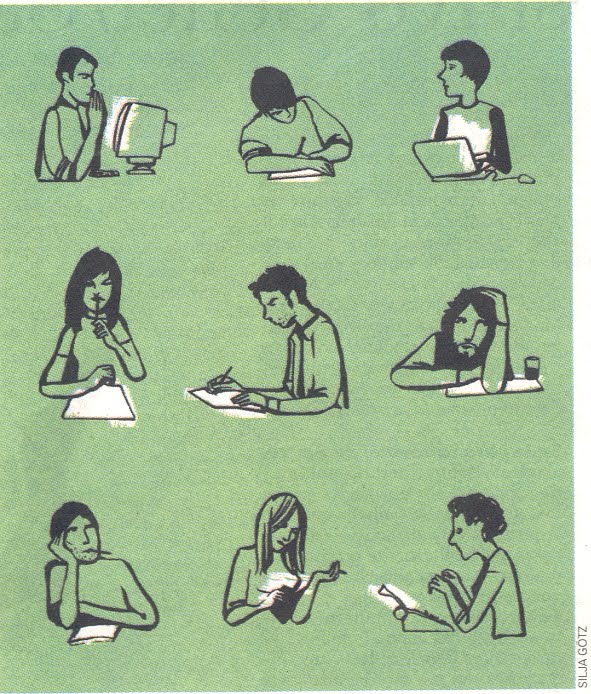cando miña nai morreu era moi novo,
e meu pai vendeume podendo a miña lingua
apenas berrar "sorralleiro! sorralleiro!"
así que limpo as vosas chemineas e durmo no sorrallo.
aí anda o pequeno Tom Dacre, que chorou cando a cabeza,
rizada coma costas de cordeiro, lle raparon: así que lle dixen
"cala, Tom!, non che importe, pois cando teñas a cabeza rapada
sabes que o sorrallo non che estragará eses cabelos brancos."
e así calou e esa mesma noite
cando durmía, tivo unha visión!
miles de sorralleiros, Dick, Joe, Ned e Jack
todos eles pechados en cadaleitos de negro.
e veu un Anxo cunha chave brillante,
e abriu os cadaleitos e liberounos;
brincan por unha planicie verde abaixo, rin, corren,
e lávanse nun río, e brilan ao Sol.
logo, espidos e brancos, cos sacos por aí,
suben ás nubes e xogan no vento;
e o Anxo díxolle a Tom, que se era un neno bo,
tería a Deus coma pai seu, e nunca lle faltaría ledicia.
e así espertou Tom; e erguémonos na noite,
e fomos traballar coas nosas bolsas e vasoiras.
inda que ía frío na mañá, Tom estaba ledo e non o sentía;
así que, se todos fan o seu traballo escusan temer mal.
 |
| nenos da rúa na época na que apareceu o poema |
When my mother died I was very young,
And my Father sold me while yet my tongue
Could scarcely cry " 'weep! 'weep! 'weep! 'weep!"
So your chimneys I sweep, & in soot I sleep.
There's little Tom Dacre, who cried when his head,
That curl'd like a lamb's back, was shav'd: so I said
"Hush, Tom! never mind it, for when your head's bare
You know that the soot cannot spoil your white hair."
And so he was quiet, & that very night
As Tom was a-sleeping, he had such a sight!
That thousands of sweepers, Dick, Joe, Ned, & Jack,
Were all of them lock'd up in coffins of black.
And by came an angel who had a bright key,
And he open'd the coffins & set them all free;
Then down a green plain leaping, laughing, they run,
And wash in a river, and shine in the Sun.
Then naked & white, all their bags left behind,
They rise upon clouds and sport in the wind;
And the Angel told Tom, if he'd be a good boy,
He'd have God for his father, & never want joy.
And so Tom awoke; and we rose in the dark,
And got with our bags & our brushes to work.
Tho' the morning was cold, Tom was happy & warm;
So if all do their duty they need not fear harm.
unha pequena cousa negra entre neve,
berrando "sorralleiro!" en clave de penar!
"onde están teu pai e túa nai? dime
"ambos subiron á igrexa a rezar."
"como estaba feliz sobre o páramo,
e sorría entre neve de inverno,
puxéronme roupa de morte
e ensináronme a cantar as notas de penar."
"e como son ledo e bailo e canto
pensan que non me fixeron mal
e foron cumprimentar Deus, o seu Crego e o Rei,
que da nosa miseria fan Ceo."
 |
| William Blake |
A little black thing among the snow,
Crying " 'weep! 'weep!" in notes of woe!
"Where are thy father & mother? say?"
"They are both gone up to the church to pray."
"Because I was happy upon the heath,
And smil'd among the winter's snow,
They clothed me in the clothes of death,
And taught me to sing the notes of woe."
"And because I am happy and dance and sing,
They think they have done me no injury,
And are gone to praise God and his priest and king,
Who make up a heaven of our misery."
1. William Blake (1757-1827) publicou estes poemas (ambos chamados "The Chimney Sweeper") en 1789 (
Songs of Innocence) e 1794 (
Songs of Experience), respectivamente.
2. "sorralleiro" é unha variante dialectal empregada na provincia de Ourense, onde se preservan cousas xa desaparecidas noutras latitudes galegas. o termo sería "desenfeluxador." aquí non se utiliza porque en Cusanca falaban sempre do "sorrallo", non de "feluxe." ademais acábase antes.
3. os poemas fan referencia a un costume da época (socialmente aceptado) consistente na venda de nenos de catro ou cinco anos para limpar as chimineas. eran pequenos abondo para poder colarse polo oco abaixo e limpar o sorrallo que obturaba os condutos. nin que dicir ten que as súas condicións de traballo e vida eran absolutamente precarias.
4. a forma lírica empregada é o "couplet": pentámetros iámbicos con rima
aa bb ... esta tradución non consigue respectar este aspecto do orixinal.
5. en vista da temática claramente social destes dous poemas, chámame a atención que se describa a William Blake coma poeta "romántico" e agora teñamos un concepto tan deturpado do que significa ser tal cousa. xa sabedes, aquelo de "e que eu son moi romántic@." ou o romanticismo era outra cousa ou o deturpamos ata facelo inservible.
6. T. S. Eliot (1888-1965), outro grande, pero noutra póla totalmente distinta, describiu a arte de Blake coma "desacougante." estes dous poemas, cada un por si e os dous conxuntamnete, explican de xeito gráfico como hai momentos e lugares onde se alían a relixión, a clase política dominante, e a "sensatez" para consolidar feitos absolutamente crueis e inxustificados para algúns en beneficio doutros; neste caso, neniños pequenos limpando chimineas para que outr@s poidan estar ao quente no inverno. isto pasou, non foi conto. William Blake.
7. o canto da "experiencia" é explícito e acusatorio mentres que o da "inocencia" é implítico e irónico; por exemplo, a figura do Anxo poría en cuestión a relixión oficial, contribuínte neto á explotación de nenos crédulos en vez de protexelos e rescatalos da inxustiza.





